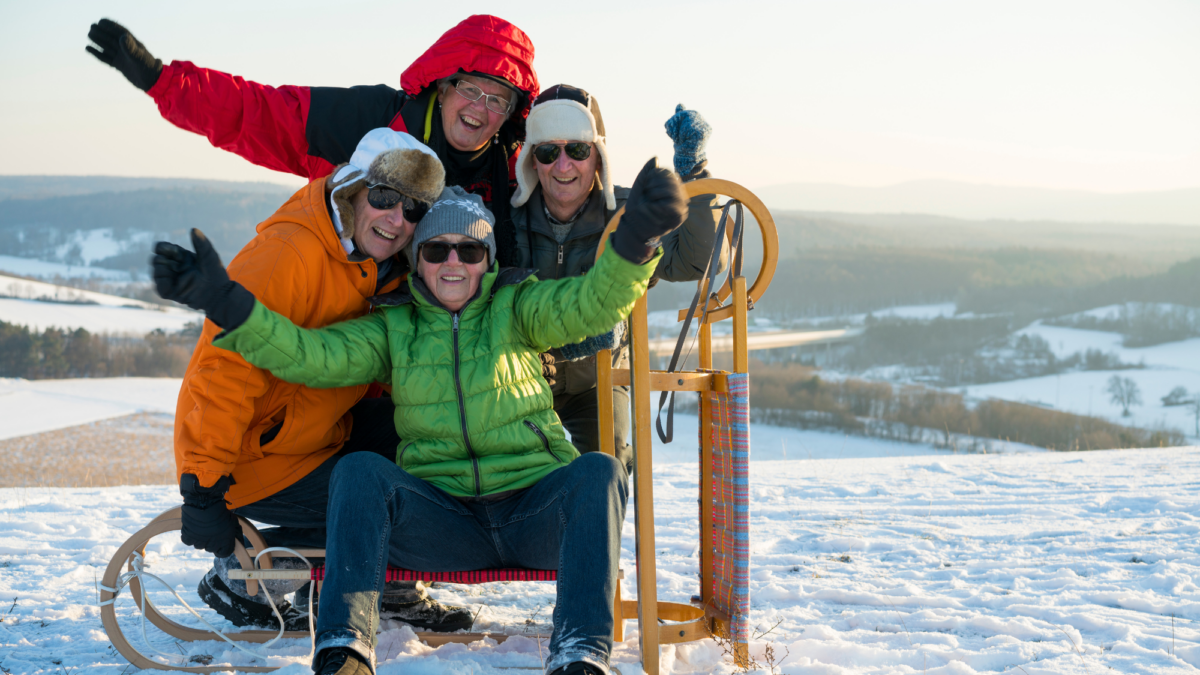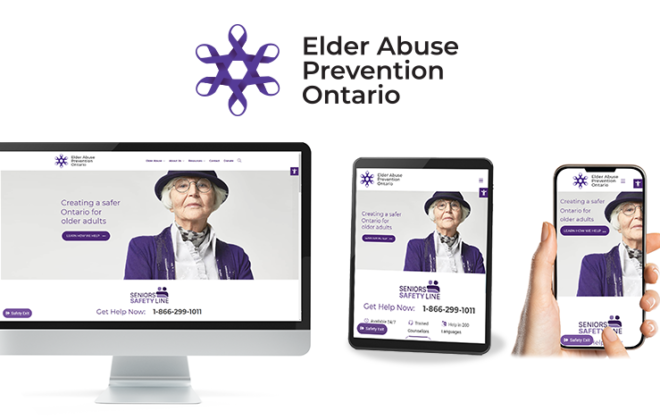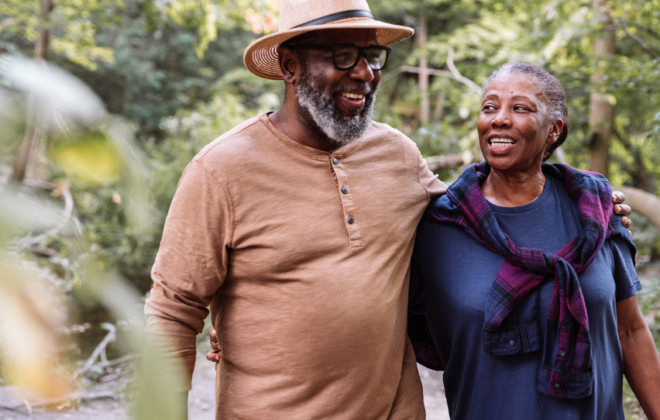Cold Weather Safety for Older Adults
Older adults have a higher chance of being affected by cold weather. Changes that come with aging can make it harder for older adults to be aware of their body becoming too cold, which can turn into a dangerous health issue quickly.
Hazards of cold weather include falls on wintry surfaces; injury caused by freezing (frostbite); and hypothermia, a medical emergency that occurs when your body temperature gets too low. Being informed and taking certain actions can help lessen risks during the colder months.
Medical conditions and cold weather
Older adults are more likely to have certain chronic medical conditions that make it harder to stay warm:
- Diabetes can prevent blood from flowing normally to provide warmth.
- Thyroid problems can affect the body’s ability to maintain a normal body temperature.
- Parkinson’s disease and arthritis can make it challenging to put on more clothes, use a blanket, or get out of the cold.
- Memory problems can cause a person to forget to take precautions for staying weather-safe, such as wearing appropriate attire.
Some medications can affect body heat, too. These include prescription medications and those bought over the counter, such as some cold medicines. Ask your doctor if medications you take may affect body heat and what you can do.
Frostbite
Frostbite is injury to the skin caused by exposure to temperatures below freezing. Having poor blood circulation, which is common in older adults, and not wearing appropriate cold-weather clothing, can increase the risk of frostbite.
Frostbite can lead to a loss of feeling and color in the affected areas, often the hands, feet, nose, and ears. If you notice redness or pain in any skin area, this may be a sign that frostbite is beginning. Protect any exposed skin and get out of the cold as quickly as possible to prevent it from getting worse.
What is hypothermia?
Hypothermia occurs when the body’s core temperature drops below 95°F. It is often caused by exposure to cold temperatures and can lead to serious health problems, such as arrythmia (irregular heartbeat), heart failure, and damage to the kidneys or liver. Hypothermia can also occur at cool temperatures (above 40°F) if you become chilled from rain, sweat, or being in cold water.
Hypothermia affects the brain and makes it difficult to think clearly, so people may not realize what is happening and that they need help. It’s important to be aware of warning signs and early symptoms, including:
- Cold feet and hands
- Puffy or swollen face
- Pale skin
- Shivering or shaking
- Slowed or slurred speech
- Feeling sleepy, angry, or confused
If the exposure to cold continues, later symptoms of hypothermia can include stiff and jerky arm and leg movements, slow heartbeat or breathing, loss of consciousness, and eventually, death.
Hypothermia is a medical emergency. If someone is showing signs of hypothermia, call 911 right away. Try to move the person to a warmer place, offer them a warm drink, and wrap them in dry blankets, towels, or coats.
Preventing unsafe exposure to cold outdoors
Here are some tips for keeping warm when the temperature drops outside:
- Check the weather forecast for windy and cold days. A heavy wind can quickly lower your body temperature — try to stay inside or in a warm place.
- If you must go out on windy, cold, or damp days, don’t stay outside for long.
- Let others know when you’re planning to spend time outdoors and carry a fully charged mobile phone.
- Keep warm blankets and extra cold-weather clothing in your car.
- Wear a hat, scarf, and gloves or mittens to prevent loss of body heat through your head and hands. Also consider using disposable or rechargeable hand- and foot-warming products.
- Wear warm and loose layers of clothing. The air between the layers helps to keep you warm.
- Wear a waterproof coat or jacket if it’s snowy or rainy.
Change out of damp or wet clothes as soon as you can.
Avoiding falls in cold weather
To help reduce the risk of falls in icy and snowy weather during the winter months, it’s important to ensure that surfaces are as dry and safe as possible.
- Keep outside walkways clear of snow and ice with an ice melt product or sand.
- Avoid shoveling snow yourself when possible. In addition to the risk of falling, there is a risk of heart attack for older adults while shoveling snow.
- Use railings to help avoid slipping on icy stairs and walkways.
- Wear nonskid, rubber-soled, low-heeled footwear.
If possible, stay inside when the weather is bad. Consider using services that deliver prescriptions, groceries, and other necessities so you don’t need to go out.
Staying warm indoors
About 20% of injuries related to exposure to cold occur in the home. Here are some tips to help keep warm:
- Set your heat to at least 68°F. Even mildly cool homes with temperatures from 60 to 65°F can lead to hypothermia in older adults.
- Place a rolled towel in front of doors to keep out drafts.
- Keep your blinds and curtains closed, and if you have gaps around the windows, try using weather stripping or caulk to keep the cold air out.
- Dress warmly on cold days, even if you are staying inside. Wear socks and slippers and make use of throw blankets.
- When you go to sleep, use extra covers. Wear long underwear under your pajamas and consider wearing a head covering.
- Make sure you eat enough food to maintain your weight — some body fat is necessary for staying warm.
- Avoid or limit alcohol intake. Alcoholic drinks can make you lose body heat.
- Ask someone to check on you during cold weather. If a power outage leaves you without heat, try to stay with a relative or friend.
You may be tempted to warm your room with a portable space heater, but some space heaters are fire hazards or can increase the risk of carbon monoxide poisoning. The Consumer Product Safety Commission has more information on the use of space heaters. Read the following for tips on using space heaters safely: Reducing Fire Hazards for Portable Electric Heaters and Seven Highly Effective Portable Heater Safety Habits.
Finding help for heating bills
If you are having a hard time paying your heating bills, there are resources that might help.
- Contact the National Energy Assistance Referral at 866-674-6327 or email to get information about the Low Income Home Energy Assistance Program.
- Increasing the energy efficiency of your home can help keep heating bills down. Contact your local Weatherization Assistance Program for more information.
- Your local Area Agency on Aging, senior center, or social service agency may have information on special assistance programs.
The Article originally Appeared at: https://www.nia.nih.gov/health/safety/cold-weather-safety-older-adults





